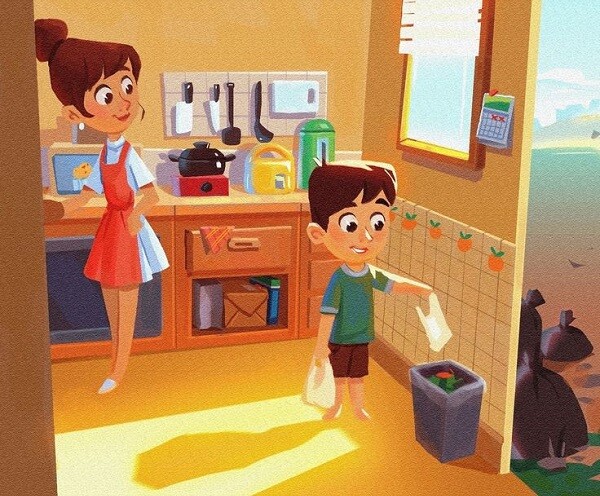While most parents shower their children with endless love and support, providing a warm and secure environment, there can be underlying discord in the parent-child relationship.
Certain behaviors exhibited by some parents can be akin to hidden rocks in the dark, causing unintended obstacles and hindering their child’s natural development. The three most common aspects are as follows.


Controlling their child’s life and verbal abuse
Some parents are accustomed to imposing their wishes and ideas on their children. Everything from food, clothing, housing, daily transportation to education, career plans, and even choice of life partners must conform to the parents’ standards.
In their eyes, these decisions are a form of guidance, ensuring their child’s future success and happiness. However, this can have profound negative effects on the child’s psychology.
“You must wear this dress; the others won’t look good on you!” “Enroll in this major for your future; don’t follow your interests.” Such controlling statements hinder the child’s ability to make independent choices and develop freely.

Controlling a child’s life and verbal abuse.
When all decisions must adhere to the parents’ opinions, children are not encouraged to explore, develop their interests, and pursue their passions. Instead of being nurtured in an environment that fosters creativity and free thinking, they feel confined and pressured.
Consequently, they may not dare to express their personal opinions or pursue their dreams. Moreover, statements like “Why are you so stupid? You can’t even do this simple task!” “Look at how others are doing it” induce feelings of shame and low self-worth. Children start comparing themselves to others, leading to negative thoughts about their value.
Children raised in such a verbal environment tend to become timid and doubtful of themselves. They lack the confidence and courage to embrace their true potential. Instead of facing challenges head-on, they often choose to escape or give up when faced with difficulties.

Lack of positive role modeling in terms of character
Children learn behavior by observing their parents’ words and actions. If parents exhibit moral flaws such as selfishness, dishonesty, unreliability, or exploitation of others, it can easily influence their children.
For instance, some parents may be concerned about getting along with their neighbors but constantly argue over trivial matters. They may deceive and boast at work while teaching their children to be diligent and progressive. This contradiction is unconvincing.
When children witness their parents acting contrary to the values they preach, it confuses them and makes them question what to believe. This contradiction can lead to a loss of trust in their parents and doubt the moral values they are being taught.

Parents should set a good example for their children.
Over time, children may come to believe that these negative behaviors are acceptable and unconsciously exhibit similar character flaws. They may become selfish, dishonest, or irresponsible, forming bad habits that are hard to break. Moreover, a lack of positive role modeling can result in children growing up without a sense of self-evaluation.
When children are not taught to distinguish between right and wrong through their parents’ behavior, they may struggle to develop solid personal values and principles. Instead of becoming responsible and ethical citizens, they may focus solely on self-interest without considering the consequences.

Negative attitude towards challenges
Many parents exhibit passive behavior when faced with difficulties and failures in life. Instead of actively seeking solutions, they constantly complain, sigh, and transfer their negative energy to their children.
Statements like “We can’t get through today; any misfortune will befall us” unintentionally create a heavy atmosphere in the family, impacting the children’s psychology.
Children enveloped in such negative emotions for an extended period may struggle to develop an optimistic outlook. As they grow up, they may feel helpless and desperate when faced with life’s challenges.
Their sense of self-efficacy will be affected, and they may find it challenging to face obstacles and seize opportunities with a positive attitude.

Transmit positive energy and love to your children.
In reality, all parents love their children, but love entails more than just providing material needs. It also involves guidance, positive role modeling in words and actions, and instilling moral values and a positive lifestyle.
Parents need to demonstrate strength and resilience when facing difficulties, inspiring their children. By staying positive and seeking solutions instead of complaining, parents can teach their children to develop a positive mindset, overcome challenges, and embrace difficulties.
Additionally, parents should encourage their children to participate in resolving family issues, understanding that challenges are an inevitable part of life and an opportunity for growth.
By creating a loving and supportive family environment, children can truly embrace the blessings, gain confidence, and move forward boldly. They will be able to build a bright future, solid moral values, and personal qualities. Moreover, they will learn to establish and maintain sincere relationships.
“The First Eight Years: Nurturing Your Child’s Character Development”
“Don’t worry if you can’t build a house yet; focus on building yourself first. Investing in self-improvement will save you a fortune in the long run, and the results will be well worth the wait. The first eight years of a child’s life are crucial, so parents must prioritize accompanying their children during this formative period.”







































